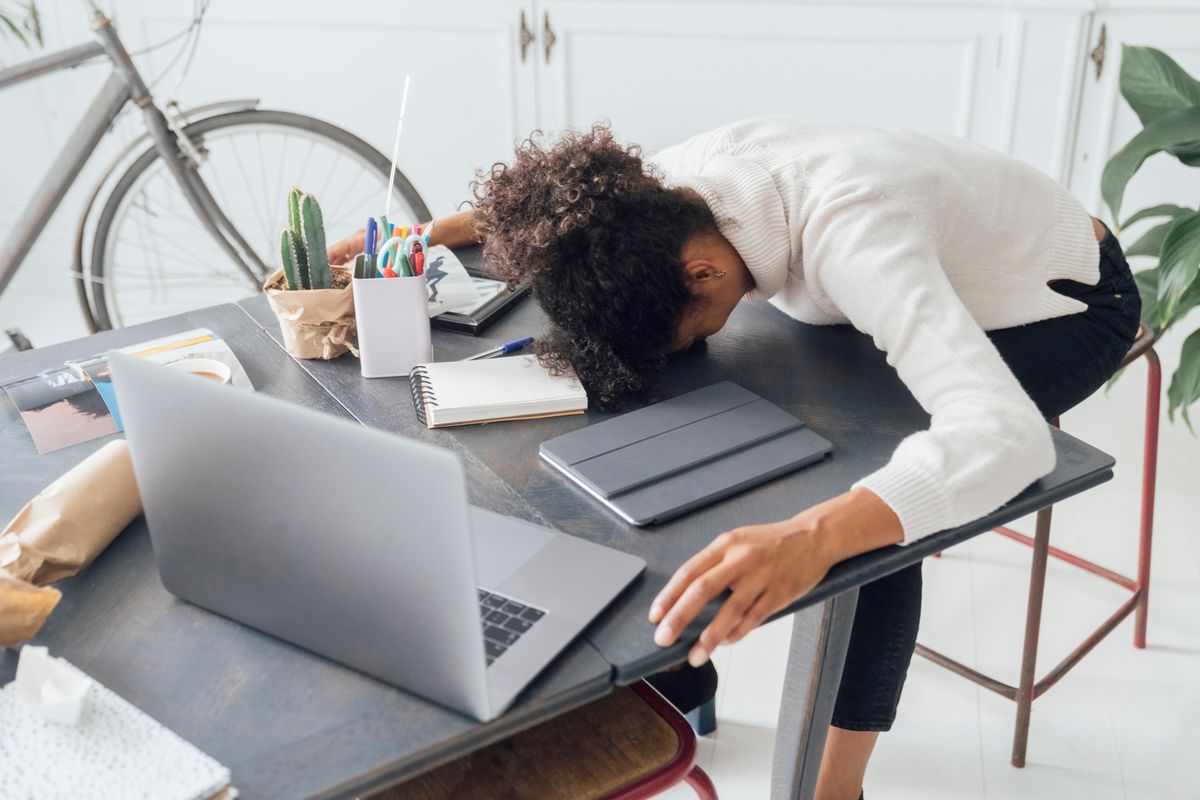16 Ways to De-Stress After Work When Dealing With Stress From Work
13 mins,

Work stress can be overwhelming, but what you do after work determines how well you bounce back the next day. Instead of carrying the burden home, adopt healthy ways of dealing with stress from work so you can enjoy a balanced life.
In this article, we discuss 15 ways to relieve job stress after work, helping you feel more relaxed and ready to enjoy your free time.
According to a recent study, work-related stress is one of the most common psychological symptoms that modern people increasingly experience.
If you often feel drained, anxious, or mentally exhausted after work, try these 15 effective stress-relief strategies to help you relax, recharge, and regain control.

Physical activity is one of the best ways to blow off steam after work. Exercise releases endorphins, your body’s natural stress relievers, making you feel more relaxed and refreshed.
The right type of workout tends to leave you relieved after the day’s ‘hustle.’ Mindful exercises like Yoga release endorphins – hormones that work in reducing aches and boosting pleasure, making you feel happy in general.
Consequently, these exercises reduce stress and job strain.
Remember the reason for the exercise is to relax, so exercises like road walk, skipping, yoga, and dancing are encouraged, rather than more strenuous workouts like weightlifting, to achieve the desired result.
Examples:
Even a short evening walk can help clear your mind and transition from work mode to relaxation mode.

What you eat plays a big role in managing stress. Unhealthy comfort foods like processed snacks, sugary drinks, or excessive caffeine can spike your stress levels instead of calming them.
The benefits of eating right cannot be overemphasized as a balanced diet is key to experiencing a stress-free day. Embracing healthy eating as a lifestyle is pivotal in fueling how good you feel.
It does not necessarily imply that you should eat special foods, but simple diet changes like switching from eating junk to eating fruits and vegetables can greatly impact your stress level. Make sure to eat meals that have healthy nutrients in their right proportion.
Try instead:
Switching to nutrient-rich foods not only helps regulate mood but also prevents stress-induced cravings that lead to unhealthy eating habits.

Having a wind-down routine can signal your brain that the workday is over. Look for activities that put your mind and body at ease.
It could be as simple as listening to your favourite music, sleeping early, writing, or watching movies. Whatever gets you to unwind at the end of the day is highly encouraged.
Relaxation helps to make your muscles less tense, so expect the headaches to ease off at the end of these routines.
Look for activities that put your mind and body at ease. It could be as simple as listening to your favourite music, sleeping early, writing, or watching movies.
Whatever gets you to unwind at the end of the day is highly encouraged.
Relaxation helps to make your muscles less tense, so expect the headaches to ease off at the end of these routines.
Examples of relaxation rituals:
A calming bedtime routine improves sleep quality, which is important for handling stress the next day.

It’s tempting to grab a glass of wine or beer to “destress,” but relying on alcohol can backfire. It may provide temporary relief but worsen anxiety and sleep issues in the long run.
Healthier alternatives:
Instead of numbing stress with alcohol, find activities that naturally uplift your mood and promote long-term well-being.

If you constantly check emails or think about work after hours, you’ll never truly unwind. Setting clear work-life boundaries is key to preventing burnout.
Bringing work from the office to your home only does more to destabilize your mind. Try as much to keep these two worlds apart.
This can be achieved by doing your best to finish all the projects you have for the day at your workplace. With this in place, you can rest assured that you are going home to rest and not work again.
Practical ways to unplug:
When you draw the line between work and personal time, you reclaim your evenings for relaxation and fun.
Breathing exercises can instantly reduce stress by activating your body’s relaxation response.
Try this simple breathing exercise:
Apps like Calm, Headspace, or Insight Timer offer guided meditation sessions to help you release stress and feel more present.
Engaging in a creative or recreational activity helps shift your focus from work to something enjoyable.
Examples of hobbies for relaxation:
Hobbies offer a healthy escape from workplace stress while keeping your mind engaged in a fun, fulfilling way.

Talking to someone you trust can instantly lighten the emotional load of a stressful workday.
Ways to connect socially:
Social interactions provide emotional support, making it easier to let go of work stress and enjoy meaningful moments.
Spending time outdoors has been scientifically proven to lower cortisol levels, the stress hormone.
Ways to enjoy nature:
Nature therapy is a powerful stress reliever that costs nothing but provides major benefits to your mental health.
Excessive screen time, especially at night, tricks your brain into staying alert, making it harder to unwind.
How to limit screen exposure:
This simple habit can improve sleep quality and help you wake up feeling refreshed.
Music has a direct impact on mood and can help release tension after a long day.
Relaxing listening ideas:
Create a stress-relief playlist to play in the background while cooking, cleaning, or relaxing.
Focusing on what went right instead of what went wrong can shift your mindset and reduce stress.
Gratitude practice:
Over time, this practice rewires your brain to see the positive side of life, even on tough days.
Laughter reduces stress hormones and releases feel-good chemicals like dopamine and serotonin.
Laughter is a natural stress-buster. The more you laugh, the better you feel!
Feeling overwhelmed by tomorrow’s workload can prevent you from relaxing today.
Simple planning tips:
Planning ahead helps you start the next day with clarity instead of anxiety.

A well-rested mind is better equipped to handle stress.
Better sleep habits:
Quality sleep restores energy, sharpens focus, and helps you wake up feeling refreshed instead of drained.

Drugs are chemicals whose job is to set off a series of chemical reactions in your body once ingested. Stress has been shown to increase one’s inclination towards addiction to drugs in general as over time, myths and misconceptions have spread that these drugs help to relieve stress.
On the contrary, heroin, cocaine, and the like stimulate the release of the Corticotropin-releasing Factor (CRF), the very hormone that causes the body to react to stress.
With this in mind, if you have fallen victim to this ploy, you should work towards looking the other way when it comes to hard drugs.
Managing job stress doesn’t require drastic life changes. It needs just simple, consistent habits that help you unwind daily.

Work-related stress is currently on the rise and no particular occupation is exempted. Teachers, Traders, Project Managers, Health Practitioners, and almost everyone with a job stand a risk of experiencing this. However, with the 5 ways to relieve job stress after work outlined in this article, you can overcome it and come out refreshed, relieved, and ready to be the best version of yourself the next day.
It is worth reiterating that abusing drugs to handle stress is not just a bad idea but a dangerous one at that. Should the stress-related headaches and body pains persist, Consult a Doctor Online to get expert advice and drug prescriptions to manage stress effectively.
After a long day at work, job stress can weigh you down badly. Fortunately, telemedicine is here to help.
With telemedicine, you can connect with a doctor or therapist online and talk about what is bothering you, which can be very helpful when you’re feeling overwhelmed.
These professionals will help you through your condition with personalized treatment plans and strategies other than the 5 ways to relieve job stress after work listed in this article.
Another advantage of telemedicine is that it’s so convenient. Imagine coming home from the day’s hustle and bustle and just wanting to relax. Instead of going out again to see a doctor at the hospital, you can simply hop on a video call from the comfort of your home.
This makes it easier to get advice and support for managing your stress, whether it is through learning relaxation techniques, getting tips on better sleep, or just having someone to talk to about your day.
Another awesome thing about telemedicine is how quickly you can get help. You don’t have to wait for days or weeks for an appointment. You can set up a virtual visit much sooner, which means you can start working on your job stress faster.
Whether you need strategies to unwind after work, help with anxiety, or just a little guidance on how to handle job stress, telemedicine can make a big difference in helping you feel more relaxed and in control.
You can relieve yourself from stress by taking short breaks throughout the day, taking time off for a vacation or me-time, focusing on your hobbies and the things you love, and leaving work stuff at work.
There are many things you can do to reduce (or eradicate) the pressures from work. You can practice meditation, engage in physical activity, create time for your hobbies and what makes you happy, enjoy quality time with yourself, family, and friends, and always plan ahead for the next day.
You probably have work-related stress if you experience low productivity accompanied by feelings of lack of fulfillment. Other signs include lack of motivation, inability to ‘switch off’ from work, insomnia, headaches, etc.
You trigger stress when you are under a lot of pressure, have so many work responsibilities, trying to meet several different deadlines, or experience conflict or abuse in your workplace.
When you are too stressed, your body, behaviour, thoughts, and feelings get affected. You may even suffer from physical conditions like heart attack, high blood pressure, headaches, heart disease, and stroke.
Medical Disclaimer: KompleteCare™ aims to improve the quality of life for everyone with fact-based content about the nature of diseases, preventive care, behavioral health conditions, treatment options, and their related outcomes. We publish material that is researched, cited, edited, and reviewed by licensed medical professionals. The information we provide is not intended to be a substitute for professional medical advice, diagnosis, or treatment. It should not be used in place of the advice of your physician or other qualified healthcare provider.
Indeed (2023) How To Relax After Work: 12 Ways To De-Stress
Koutsimani, P., Montgomery, A., & Georganta, K. (2019). The Relationship Between Burnout, Depression, and Anxiety: A Systematic Review and Meta-Analysis.
Bolliger, L., Lukan, J., Colman, E., Boersma, L., Luštrek, M., Bacquer, D. D., & Clays, E. (2022). Sources of Occupational Stress among Office Workers—A Focus Group Study.
Miyoshi, Y. (2019). Restorative yoga for occupational stress among Japanese female nurses working night shift: Randomized crossover trial.
Healthline (2024) How to Keep Work Stress from Taking Over Your Life
Oghenero Estella Godwin is a Content Writer at KompleteCare. She's passionate about designing, writing and learning new skills. Get in touch with Estella at [email protected]
We publish helpful posts every week!
1 comment
[…] originate from work, depression, grief, financial strain and pretty much any aspect of our lives. Managing Stress is fundamental to maintaining a healthy heart. […]